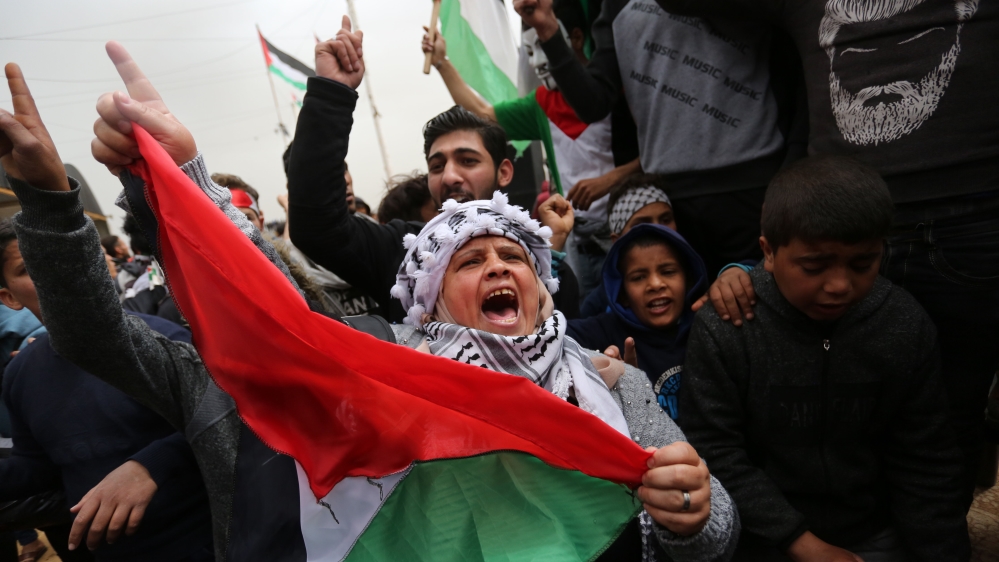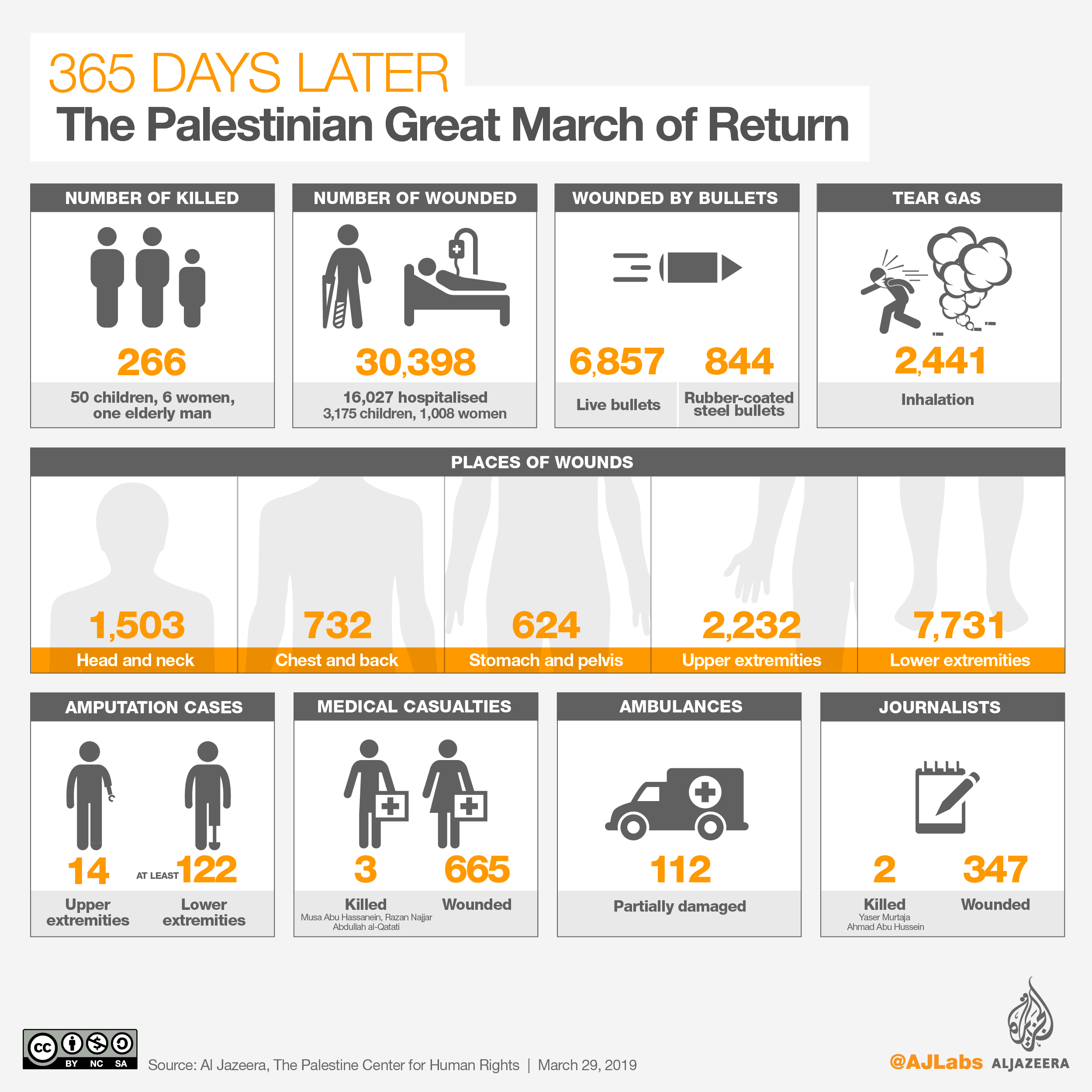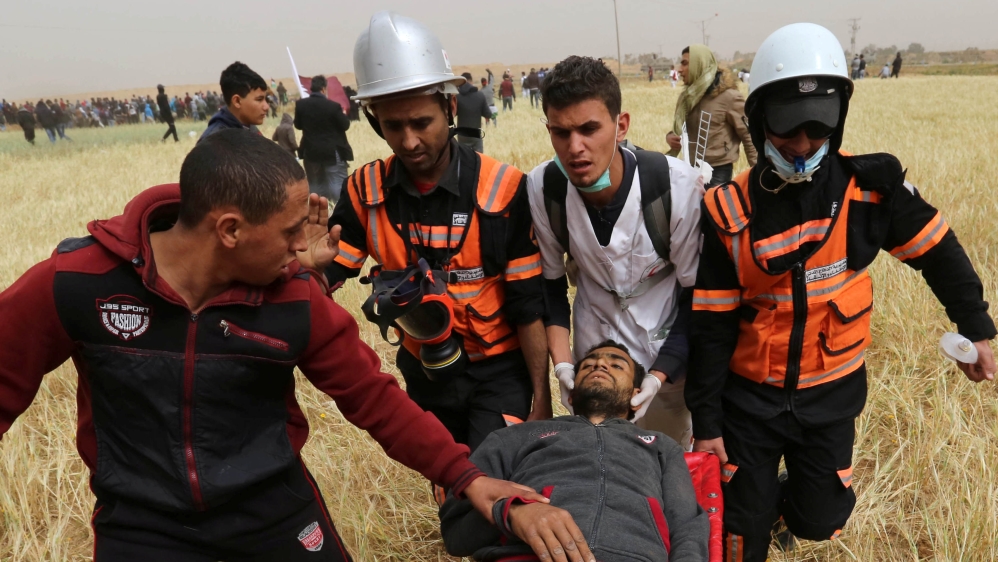‘Our people will not back down’: Gaza marks protests anniversary
Tens of thousands of Palestinians have rallied at the Israel-Gaza fence to mark the first anniversary of the Great March of Return protests, facing off against Israeli tanks and troops massed on the fortified perimeter.
Israeli forces on Saturday used live rounds, rubber bullets and tear gas on the protesters, killing two 17-year-old boys, and wounding at least 207 people, according to Gaza’s health ministry.
Tamer Aby el-Khair was shot in the chest east of Khan Yunis in southern Gaza and died at the hospital, the ministry said. The second teen, Adham Amara, died after being shot in the face east of Gaza City, the Associated Press news agency reported.
A third Palestinian was killed in an overnight demonstration ahead of the main protest.
Palestinians are demanding the right to return to lands from which their families were violently expelled during the founding of Israel in 1948. They are also calling for an end to Israel’s and Egypt‘s 12-year blockade of Gaza.
“We will move towards the borders even if we die,” said Yusef Ziyada, 21, his face painted in the colours of the Palestinian flag. “We are not leaving. We are returning to our land.”
Despite heavy rain, some 40,000 people were gathered at the frontier area, the Israeli army said.
 |
|
The Great March of Return protests began on March 30 last year after civil society groups in Gaza called for action against the crippling Israeli blockade against the enclave [Ashraf Amra/Anadolu] |
Most protesters were keeping away from the fence, but some hurled stones and explosive devices at the structure and set tires ablaze, the army said, adding that it was responding with “riot dispersal means and firing in accordance with standard operating procedures”.
Describing the rally as “completely peaceful”, Mohammed Ridwan, a 34-year-old protester who works at a Gaza think-tank, told Al Jazeera the huge turnout on Saturday was “ample proof that our people will not back down until they gain their legitimate rights”.
Bahaa Abu Shammal, a 26-year-old activist, said he was at a protest site “very far away from the separation fence”, but still, nearly “suffocated due to Israeli tear gas”.
He told Al Jazeera: “We need to break the brutal siege we suffer from. We want to return to our occupied lands.”
‘Children killed’
For the past year, the Israel-Gaza fence has been the scene of mass protests and major bloodshed in which more than 260 Palestinians were killed, mostly by Israeli sniper fire. Nearly 7,000 others were shot and wounded, according to Gaza’s health ministry.
Save the Children, a rights group, said those killed include 50 children. Another 21 children had their limbs amputated and many more have been permanently disabled, said the group’s regional director, Jeremy Stoner.
Expressing deep concern over the Palestinian teen’s death on Thursday, Stoner said: “We fear that more children could be injured or killed today.”
 |
Hamas-Israel truce
The anniversary of the Great March of Return comes only days after another severe flare-up of violence between Israel and Hamas, which rules Gaza. Egypt has sought to mediate between the two parties in a bid to rein in violence and avoid the sort of deadly response from the Israeli military that has accompanied past protests.
Al Jazeera’s Harry Fawcett, citing the Hamas-affiliated al-Risalah newspaper, said the group had reached a deal with Israel to reduce tensions in the Gaza Strip.
“The Israeli concessions, according to the al-Risalah newspaper, include increasing Qatari funding from $15m to $40m a month to pay salaries; extending the fishing zone from nine to 12 nautical miles; increasing the electricity supply from Israel into Gaza; and approving a major desalination project,” Fawcett said, reporting from an area east of Gaza City.
“In return, Israel has been seeking an end to rocket fire, such as that which destroyed a family home north of Tel Aviv on Monday, injuring seven and sparking a new round of escalation.”
Abdullatif al-Kanoo, a spokesman for Hamas, confirmed the agreement, saying Egyptian mediators “succeeded in extracting approvals” from Israel to ease restrictions on employment, fishing, electricity and aid from Qatar.
“In the coming days, a timetable will be set for the implementation of what has been agreed on,” he told Al Jazeera.
 |
| A wounded Palestinian is evacuated during the Great March of Return protests in the southern Gaza Strip [Ashraf Abu Amrah/ Reuters] |
Meanwhile, on the eve of the anniversary protests, organisers issued instructions to demonstrators telling them to stay back from Israeli guns, follow commands of organisers on the ground, refrain from aggressive actions and not to burn tyres, a move seen as a sign that the Egyptian-brokered deal may be adhered to.
Hamas security officers at the scene of the protest were seen wearing military uniforms for the first time, as they picked up tyres and took them away.
“It looks as if they are here to enforce the deal, to make sure that no one sets these tires alight,” Fawcett said.
Israel, which has sent extra troops and tanks to the border, also wants an end to incendiary balloon launches, and a guarantee of calm at the fence.
There was no Israeli comment on the alleged agreement.
‘How many years before our lives improve?’
The Great March of Return protests began on March 30 last year after civil society groups in Gaza called for action against the crippling 12-year blockade on the enclave.
Humanitarian agencies blame the blockade for impoverishment in Gaza, where poverty and unemployment rates are high. According to the United Nations, more than 90 percent of water is unsafe for drinking, while Gaza’s two million residents receive less than 12 hours of mains electricity a day.
March 30 also marks Land Day – the annual commemoration of the deaths of six Palestinians in 1976, who protested the confiscation of their land to build Jewish communities.
“In a year I will finish school. My father is unemployed so I will be unable to go to university. Who is responsible? Israel,” said 16-year-old protester Mohammed Ali.
“I don’t know how many years will pass before our lives improve but we should continue [protests] as long as the occupation and the blockade exist,” he told Reuters news agency.
Israel’s use of lethal force against protesters has drawn censure from the UN and rights groups.
A UN investigation found that while some demonstrators used violence, the vast majority were unarmed and peaceful. Israeli forces may be guilty of war crimes for using excessive force, it said.
Meanwhile, Israeli Prime Minister Benjamin Netanyahu has been trying to balance projecting military strength with seeking de-escalation before Israel’s general election on April 9.
“All Israelis should know that if a comprehensive campaign is required, we will enter it strongly and safely, and after we have exhausted all of the other options,” Netanyahu said.
Hamas is also under domestic political pressure.
Earlier this month, protesters took to the streets instead of the border over price rises and tax hikes. Hamas security put the demonstrations down with beatings and arrests.
At the core of those protests were the same feelings of frustration that, for a year now, have brought thousands to the border, week after week.
Rana Shubair and Maram Humaid contributed reporting from Gaza.




